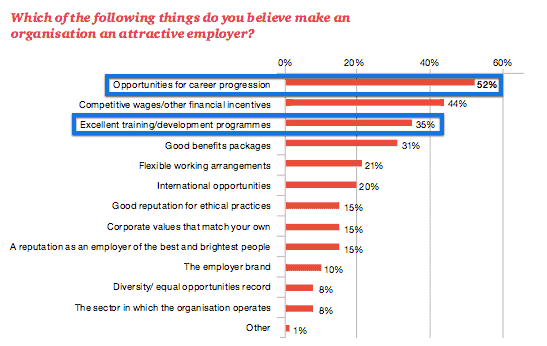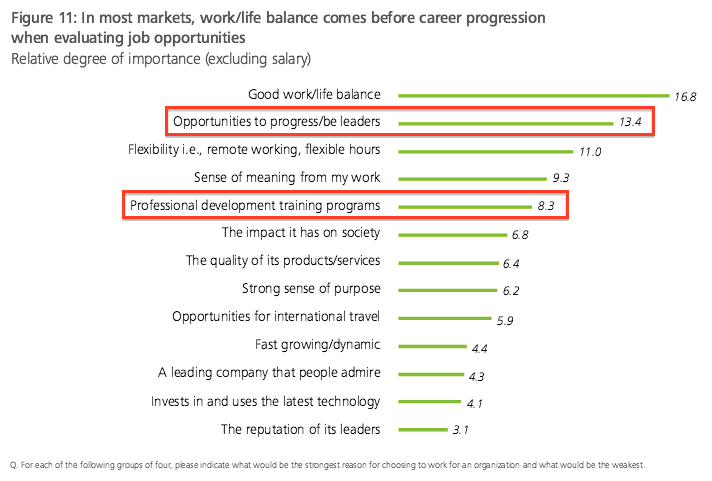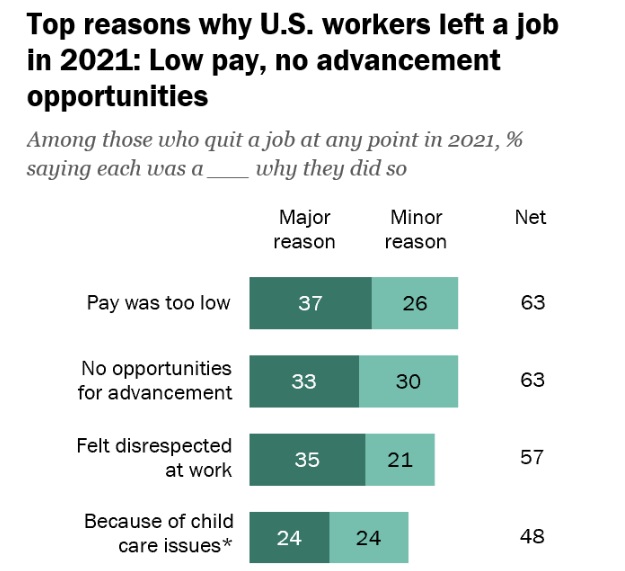You're not alone. It's not just you.
The leading benefit that Millennials (and many others at work) want in a job is the opportunity for career growth and development.
Studies by PwC:


and Deloitte agree:
Career growth and development are some of the top things people look for in jobs.
Yet, most aren't growing.
Unfortunately, many jobs promising growth are a bait and switch. Often, the hiring process is the last time your career growth is discussed at your job.
Once you start, you're dropped into the rat race trying to help your team keep up and complete tasks and projects.
You may be asked again about your career goals at review time. However, by the second review, you realize it's a box to be filled in for HR, not something discussed on an ongoing basis.
And that’s why, according to recent Pew Research Center insights, having no opportunities for advancement was the second highest reason for leaving a job in 2021.

Is changing jobs the only way to grow?
Part of the reason we suspect career growth is such a high priority when you look for a job is because you weren't getting growth and development at your last one.
You can absolutely change jobs every few years to satisfy your desire for growth. However, that still leaves a lengthy period of time when you're not growing once you settle into a job and before you move onto the next one.
This can make future job searches harder, as you have to start practicing a good answer to why your resume looks like you're a job hopper.
It may seem like companies will still hire you, but ask yourself: What kinds of companies are most likely to overlook flaws in resumes and new hires? The best can usually be picky.
Table of Contents:

Nurturing More Career Growth Opportunities: 6 Ways for You to Make it Happen
With so many managers and companies not investing in their people's growth, it's often up to you to decide how you're going to grow. These tips can help you make more progress on your growth and nudge your managers towards engaging you more in the growth you crave.

PSA: Most managers are good people.
While there are some bad apples in the world of management (represented humorously by Dilbert comics like the one above), most are well-meaning. There are many reasons why your manager may not be as proactive about your career growth opportunities as you'd like:
- They don't know - Managers are not mind readers. If you haven't brought it up, they don't know it's important to you. No one will care more about your career than you, so the first step is to make sure they know.
- They're overwhelmed - Many managers are individual contributors and managers, or they have a huge team of 10+ people. Both cases make it easy to forget to make long term investments while fighting fires.
- It's not rewarded - If your company doesn't measure or reward managers for growing their people (like Google does), it won't be a priority. It can still become important to them, but only if you push for it and they realize it's key to your happiness and motivation.
- They don't know how - It's common to be baptized in fire as a manager with no training. They may fear the conversation because no one ever had it with them.
- They're selfish - Yes, some managers only care about themselves. If you push for growth, they may help simply to save themselves from low performance scores for ignoring you, or it's easier than not helping.
The Bottom Line: Give them the benefit of the doubt and show some empathy. You likely have no idea the stresses, pressure, and demands they're under.
The good news is, doing these things will help you no matter what. Even if they won't help you, the majority of this you can do on your own. Let's assume and hope your manager cares at least a little bit.

1) Start during the interview process
Carefully think about what type of career growth is most important to you during your job search. Then make that discussion a part of the interview process.
Almost every company gives you time to ask questions, so asking them about what they do to invest in the growth of their people is a great way to use that time.
To avoid that simply being lip service, if you get interviewed by a future peer, ask them how the company has helped them grow, because actions speak louder than words.
Use this information to help decide what job you take.
Use your career growth in negotiations
If you get an offer, you can emphasize how this is important to you in negotiations. It's an easy thing for the company to agree to since it costs little.
Used properly, you can take advantage of the "rejection-then-retreat" tactic as explained in "Influence: the Psychology of Persuasion" by Robert Cialdini:
"Suppose you want me to agree to a certain request. One way to increase your chances would be first to make a larger request of me, one that I will most likely turn down.
Then, after I have refused, you would make the smaller request that you were really interested in all along...I should view your second request as a concession to me and should feel inclined to respond with a concession of my own -- compliance with your second request."
If investment in your growth is your goal, then if you first ask for a either a higher starting job title or salary, the concession of helping you grow (which will help you get that raise/job title) is a perfect use of "rejection-then-retreat."
Even better, once you get this agreement, you've set yourself up for success on day 1 on the job.

2) Bring it up in your first few one on ones
When you start out in a new job there are always a million questions: Where do I sit? Who are my colleagues? Where is the bathroom? What is the job really like?
While you're getting answers to these questions, don't forget about your growth.
Focus on the right things
When you get into your one on ones, it can be really tempting to focus on status updates. That's a huge mistake.
You need this time for all the things that don't fit into the rest of your work day: coaching, feedback, fixing organizational problems, and your career growth.
If you discussed growth in your offer negotiations, there should be no surprise from your manager when you ask about your growth path in the first few weeks.
Even better, it taps into the power of human desire to be consistent. As Cialdini writes later in "Influence: the Psychology of Persuasion":
"If I can get you to make a commitment (that is, to take a stand, to go on record), I will have set the stage for your automatic and ill-considered consistency with that earlier commitment. Once a stand is taken, there is a natural tendency to behave in ways that are stubbornly consistent with the stand."
The human desire for consistency is powerful. In the book, they cite examples as far reaching as why people accept fraternity hazing, buying Girl Scout cookies after you agree the girl scout can stop by your house, and voting habits after a poll based on whether they ask if you will vote on election day.
Once humans make a commitment, they work hard to stick to it. If you bring up the commitment from your job offer, it will be very hard for your manager to break a promise they just made.

3) Break your goal into small pieces
Getting a promotion, a big raise, or reaching a major goal at work does not happen overnight. Knowing this, the worst thing you can do is let a goal sit and wait to make progress on it.
Instead, take the time to talk about your career growth and break down your goal into the steps you can take to get there now. To help create the best steps, ask your manager questions like:
- What are the criteria for promotion I need to check the boxes for?
- What skills gaps do I have?
- What kinds of milestones do I need to hit?
- What kinds of projects do I need experience on?
- What are key habits that make someone successful in that role?
Once you have answers to these kinds of questions, you can start to break down ways to meet that criteria and fill in any of your skill gaps.
Brainstorming ways to learn new skills, future projects to specifically get involved in, and opportunities for mentorship, can build a healthy list of bite size steps to reach your goals. You can then pick them off one by one as they make sense to make regular, incremental progress.
The power of progress
Don't underrate the power of making regular progress. As it turns out, researchers have found this is the single greatest contributor to your workplace happiness and motivation.
Professor Teresa Amabile of Harvard and researcher Steven Kramer found:
"Of all the things that can boost emotions, motivation, and perceptions during a workday, the single most important is making progress in meaningful work.”
Is there anything more meaningful than the career growth you aspire to?
Breaking your goal into pieces you can regularly make progress on helps you reach those goals, and can keep you happy at work. Everyone wins.

4) Get your manager involved efficiently
If you're lucky enough to have a manager that's deeply invested in your growth and helps push you, congratulations. You have a rare and awesome manager. Appreciate them.
For everyone else that has a manager that fits one of the 5 types we listed above, the key is to make this process as easy as possible for them.
Any manager can help
When you make it harder to not help you grow, than to actually contribute to your career growth, even the busiest, or most selfish manager is likely to help a bit.
So what are the kinds of things a manager can do easily?
- Get approval for small budget items: your manager can help pay for a local event or conference for you to attend, buy you a book, purchase an online course for you, etc.
- Introductions: your manager can help you with an intro to a mentor or expert inside or out of the company to interview, get coffee, eat lunch, etc and learn from.
- Anticipate future opportunities: managers may know about future openings and hiring plans that may fit your goals. They also can spot upcoming projects to get you on to gain experience.
The beauty of all of these things is that you can make them less than 5 minute tasks for your manager:
- If you send them an Amazon link to the book you talked about, it takes 2 minutes to open the link, enter the company card, and order it.
- If you ask for an intro, it takes them 2 minutes to draft an email to their contact and you, and hit send.
- If you ask regularly about upcoming openings or projects, it takes just a few minutes to talk about them and establish the right time to get you involved.
Again, the goal here is to make their life easy. The smaller the ask, the easier it is for them to do it.
By using this approach, you also benefit from Cialdini's lesson on consistency we learned above.
As they follow through on your series of small requests, it builds a "stand" that is "on record" that they're invested in your career growth. This can be helpful when you have larger asks, or want their help in finally getting the raise, promotion, or new opportunity you've been striving for.

5) Write it down
Talking about your career growth is good. Writing down the plans to get you there is better.
One of the biggest mistakes managers make is to talk about things loosely and not establish clear next steps. Without clearly defined steps and ownership, it's easy for plans to fail, and for progress to be lacking.
Your manager should really take notes in your one on ones, and want to help write down the plan for your growth. However, if they are unwilling, that should not stop you from doing so instead.
The act of writing it down ensures you're both on the same page and gives a record to reflect on over time. As legendary leader and former CEO of Intel, Andy Grove, wrote in High Output Management:
"Equally important is what "writing it down” symbolizes…the act implies a commitment, like a handshake, that something will be done.”
Whether you or they wrote the plan, the record will help you stay on top of making progress. It will also help you in future reviews; if you need proof to show you're ready for a promotion, having a list of accomplishments and progress can make all the difference in building your case.
Check in during your one on ones
These small steps you're taking, and the time efficient requests you make of your manager are great. They ensure you don't go months without making progress on your career goals, and that you're getting them invested, too.
The other key piece is to check in at a high level how you're doing. You want to ask your manager things like:
- Do you feel my skills are improving in the areas we identified as weaknesses?
- What are the biggest barriers I still have to the next promotion, raise, etc?
- How have I performed on recent projects we've identified as important to my growth?
- Does our agreed upon plan still cover the most important steps?
- What would make you feel totally ready to advocate for me?
It can be hard to get a meeting on your manager's calendar to talk about these things. Using your one on one time to talk about them removes that barrier. It's a meeting you already have scheduled, and should have enough time to discuss these topics.
This is where working with your manager to have an agenda for your one on ones can help. An agenda will allow you to add these kinds of questions to the agenda so they can think about answers and feedback in advance.
You'll be making life easier for your manager once again, which makes getting what you want more likely.

6. Grow even faster by managing up well
How well do you understand your manager? If you’re too laser-focused on your own career growth, it’s easy to miss out on the simple fact that helping them, in turn, helps you.
That’s why managing up is an essential skill to learn if you want to grow your career.
Consider your manager’s needs, too
Start by asking yourself the following questions:
- How can I drive success not only for myself, but for my manager as well?
In healthy workplaces, success is shared –if you succeed, others around you can succeed as well. They probably contributed to the win as well, so remember it’s a team effort.
Most importantly, keep in mind that If you and your manager share a win, doors will be opened for both of you: think benefits, bonuses, promotions, and exciting new projects. With that in mind, ask:
- How do I align my career goals with my manager’s goals?
This is kind of an advanced move - but it really pays off. Try to actively align your career priorities with the goals of your manager.
This can apply to something as basic as everyday time management, but also to wider initiatives such as overall team or department strategy.
Is your manager’s priority at the moment to really wow a new client, or work on keeping an old one? Is it to deliver a key feature, or improve site performance? See how you can use the areas you want to grow to help their key initiatives or OKRs succeed.
When you do this, you’re both more likely to get support to work on your growth *and* get credit and recognition when you hit your goals (because then they’re your manager’s goals, too) .
As executive coach Hanna Hart recently wrote for Forbes:
“Don’t wait to be told what to do - look for opportunities to create value. Being proactive is not “above and beyond”; it is taking initiative and ownership.”
There is an art and science to managing up well, so there is a lot to learn to pull off the above successfully.
If you’re looking for more resources on managing up well to have a great relationship with the #1 person who decides your career fate, check out our other articles on the topic:
- Learn how to Manage Up Like A Pro
- Get Expert Advice for Managing Up at Work from Experienced Leaders
- Discover 3 Ways to Better Manage Up By Developing Empathy
Conclusion: Your Career Growth and Development is up to YOU.
Over time, you and your career growth discussions will evolve. The more your manager and others in the company see you progress, the more likely you are to get the kinds of opportunities and advancement you hope for.
And even if your manager isn't very helpful, the work you put in will still pay off; if you do these things, they'll lead to great resume points and qualify you for great jobs at other companies.
And for advice on leveling up and thriving as a leader, listen to our conversation with tech leader Jeremy Brown on his unconventional career path for some interesting insights:

What does career growth mean?
How do I say I want career growth?

With so many managers and companies not investing in their people's growth, it's often up to you to drive your own career growth. If career growth is important to you, make it a part of the interview process.
Almost every company gives you time to ask questions, so asking them about what they do to invest in the growth of their people is a great way to use that time.
To avoid that simply being lip service, if you get interviewed by a future peer, ask them how the company has helped them grow. Use this information to help decide what job you take.
What are types of career growth?

There are four common types of career growth paths:
- Knowledge-based: Growth based on the knowledge acquired on the job.
- Skill-based: Growth based on the skills learned or perfected over the years.
- Entrepreneur-based: Growth through selling services and/or products to solve problems.
- Freelance: Growth through working and solving problems independently.
Each of these paths cater to specific qualifications in the individual’s career growth journey.
What is a career growth opportunity?

Career growth opportunities describe different possibilities in which individuals reach levels of increased responsibilities in their work through areas like networking, skill advancements or further education.
This can often lead to attaining higher-responsibility jobs with increased levels of monetary rewards.
How do you answer the career growth question?
How can I improve my career development?

The best way to improve your career growth is to have clear goals that outline how you wish to pursue it.
Break down your goal into the steps you can take to get there now. To help create the best steps, ask your manager questions like:
- What are the criteria for promotion I need to check the boxes for?
- What skills gaps do I have?
- What kinds of milestones do I need to hit?
- What kinds of projects do I need experience on?
- What are key habits that make someone successful in that role?
Once you have answers to these kinds of questions, you can start to break down ways to meet that criteria and fill in any of your skill gaps.






